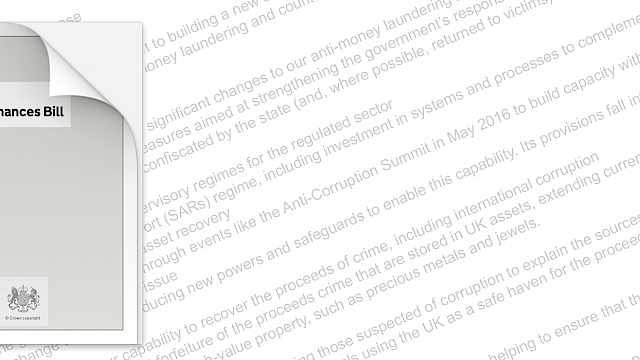In a previous CREST article, I outlined the possible impact of the counter-terrorist financing (CTF) measures that were introduced by HM Government as part of its Criminal Finances Bill. The Criminal Finances Act received Royal Assent on April 27, 2017, and represents the largest and most comprehensive overhaul of the United Kingdom’s (UK) economic crime legislative provisions since the introduction of the Proceeds of Crime Act in 2002.
These important legislative amendments are being supported by an internal audit of the UK’s economic crime agencies by the Cabinet Office. The Review was announced in December 2016 by the Home Secretary Amber Rudd MP who stated:
“The Cabinet Office will look at the UK’s response to economic crime more broadly … his will include looking at the effectiveness of our organisational framework and the capabilities, resources and powers available to the organisations that tackle economic crime.”
This announcement is a very important development, yet the full terms of reference have not been made publicly available. The announcement from the Home Secretary has prompted increased anxiety at the Serious Fraud Office, HM Revenue and Customs, the Financial Conduct Authority and the Competition and Markets Authority who have been criticised for their lacklustre responses to economic crime.
Importantly, each of these agencies covers a wide range of illegal activities including money laundering, bribery, corruption, market manipulation, insider dealing, market abuse, fraud and tax evasion. However, a worrying omission from the Review by the Cabinet Office is the financing of terrorism.
Sadly, this is another example of HM Government neglecting the introduction of much-needed reforms to its CTF legislation. The impact of the UK’s CTF legislation has declined since the introduction of the Terrorism Act 2000, the Anti-terrorism, Crime and Security Act 2001, the Counter-Terrorism Act 2008 and the Terrorist Asset Freezing Act 2010. For example, we have continued to see a steady decline in the amount of money frozen by HM Treasury, who in March 2016 reported that just £15,000 has been frozen under the Terrorist Freezing Act 2010.
We have continued to see a steady decline in the amount of money frozen by HM Treasury, who in March 2016 reported that just £15,000 has been frozen under the Terrorist Freezing Act 2010.
Further support for a decline in the use of these provisions is illustrated by the drop in the number of terrorist-related designations which has fallen from 162 to 84. Furthermore, despite a maximum custodial sentence of 14 years and/or an unlimited fine for terrorist financing, only 17% of the total number of terrorist charges under the Terrorism Act 2000 relate to terrorist financing. Therefore, the terrorist-related legislation has yielded derisory results.
In my book The Financial War on Terrorism, I argued that in order to improve the UK’s CTF policies it is strongly suggested that HM Government should merge the existing financial crime agencies into a single Economic Crime Agency. This suggestion was initially proposed before the 2010 General Election and was adopted by the Coalition Government as part of their Coalition agreement.
However, the idea was vetoed by then Home Secretary, Theresa May MP, who prioritised the creation of the National Crime Agency (NCA) following the enactment of the Crime and Courts Act 2013. The NCA is divided into four ‘Commands’, one of which tackles ‘Economic Crime’, which is another example of the fragmented approach towards terrorist financing by HM Government.
This approach has been criticised by the Home Affairs Select Committee and David Anderson QC and one way to improve the UK’s CTF efforts would be to place it under the administration of the NCA, who should be given the role of lead economic crime agency. However, given the lack of transparency from the Cabinet Office of the remit of its review, this is highly unlikely.
Copyright Information
As part of CREST’s commitment to open access research, this text is available under a Creative Commons BY-NC-SA 4.0 licence. Please refer to our Copyright page for full details.
IMAGE CREDITS: Copyright ©2024 R. Stevens / CREST (CC BY-SA 4.0)






